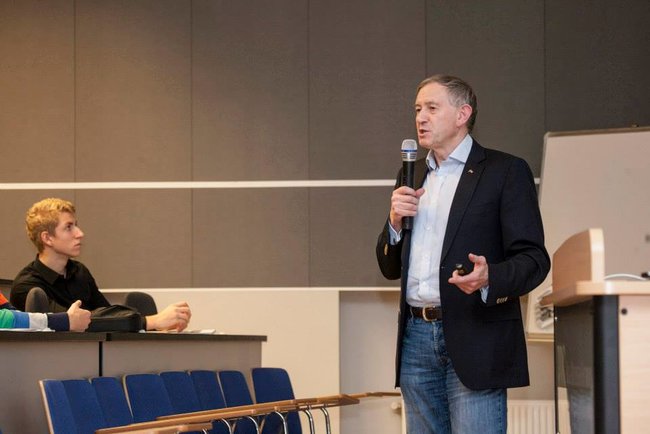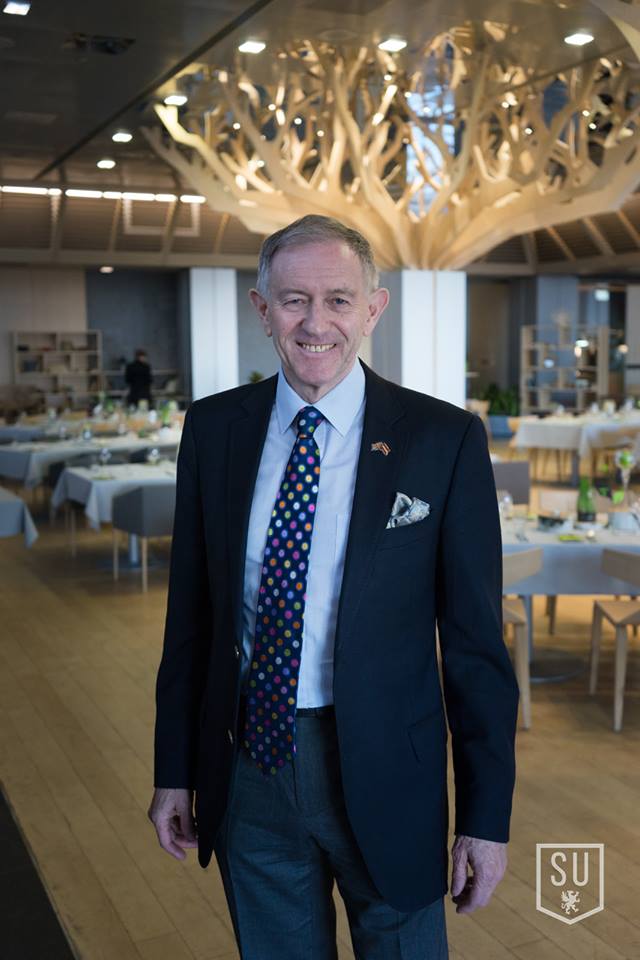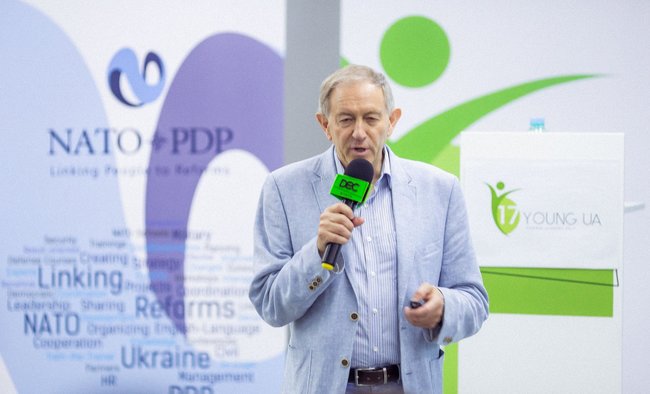How does one get to be an expert?

My defence and security expertise has come about by chance not by design. I would need a whole book to tell you how it came, but I shall try to illustrate with a few stories where my knowledge and understanding came from.
Last week, Censor.NET published an article by Glen Grant for Kyiv Post with certain additions he made for our publication. The article caused a major stir. Mr. Grant is a graduate of the Royal Military Academy Sandhurst, the Junior Division of the Staff College, Warminster, and the Joint Defence Staff College in Greenwich. The editorial board of Censor.NET asked the 64-year-old defense and reform expert to dwell on his career.
I started in the Army at 16 years and 2 months in the Royal Artillery Junior Leaders Regiment. For two years I did education, learnt all the gunnery trades and had more sport and mountains than I could manage. I was marked out as a potential officer and spent the second half of my time instructing the new soldiers. I went on a potential officer's course at the depot, passed, and got kept for another month to go on a live firing artillery exercise as the survey sergeant for the recruit battery. I was 17. Back in training I also went with the staff shooting team on competitions and so had learnt the evil ways of sergeants well before I became a proper soldier and officer.
Read more: British military expert Glen Grant plans a housing reform in Ukraine's Defense Ministry
At this stage my serious athletic career started and by 18 years of age I was the best runner in the army at 1500m and orienteering. I became a British International at 23 and Captain of the army athletics, orienteering and cross country teams. Later I became a coach and team manager. This had several advantages. I travelled with the teams often and had friends from all over the army. We shared rooms at competitions with no respect for rank so I shared with private soldiers and generals often in the same room. It was a great time to learn how an army really works in reality. I heard millions of stories about exercises and operations and stored them away.
I was also fortunate enough at the Military Academy to be sent to Sweden on military exchange for three weeks. I went back almost yearly for 2-4 weeks for the next 20 years. Sweden had a large conscript army and with them I helped train conscripts and reservists and improved my orienteering and skiing. I learnt another completely different military way of life.
After one year of Officer and artillery training I went to my first Artillery regiment. Soon we went to Northern Ireland and at 20 years of age I was commanding a troop in Belfast for six months. We were regularly shot at, mortared and my room was blown up. Luckily I was not in it at the time. We had to deal with rapes and murders not to mention acting as the police and closing huge illegal pubs every weekend night. I was trying to calm down riots against the army or Catholics versus Protestants every week and generally got little proper sleep. Luckily I had no deaths in my troop, just three shot and one badly injured by a flying brick but my next door room mate committed suicide which spoilt the time. I was back the following year for court cases putting people to prison for murder and back again over the years during thankfully quieter times.
My artillery career was fairly standard. I was command post officer, artillery observer and troop commander working with tracked and towed guns and then nuclear missiles. We were always short of officers and this meant constant extra duties. As a Troop Commander at the training depot I was regularly in military and civil courts defending or prosecuting soldiers. I was also as a junior Lieutenant, twice the chief umpire control of the rehearsal and actual UK reinforcement exercise to Germany. This was the biggest UK deployment since WW2. As a young Captain in the parachute artillery regiment I was a battery second in command of the headquarters and logistics battery, both radar and signals troop commanders, regimental recruiting officer and running the pre parachute course training for the new soldiers all at the same time.
During these 20 years, up to 6 months of the year was spent training, often on Brigade or NATO large scale exercises in the field in UK, Germany and Denmark. I also had one holiday exercise trip to Hong Kong to lecture and several in Cyprus. The best part was being on the airmobile brigade trial with my guns for 5 years first as an artillery observer, then Brigade staff and then battery commander. We travelled everywhere in helicopters and slept where we could. Several times my battery guns had to drive 200km and then arrived only as the exercise finished to turn round and drive back home again! I often ended up as Artillery Commanding Officer or Brigade commander when the exercise umpires declared their helicopter had been shot down. There is no truth in the rumour that I bribed them to do this.
I finished this phase of my life as a major as Artillery Chef of Staff in the Army Headquarters. Soon the first Gulf war started. I found myself working night shift in Army operations, as the artillery expert in the Joint Intelligence cell and trying to do my artillery work of sending the artillery to war at the same time. I staffed the UK plan for the Gulf war one night with the Army commander. I wrote whilst he drank port with the Vice Chief of Staff. To make matters worse at this time, the Government decided to reduce the army size after the Berlin wall fell and I was added to several committees and working groups on army organisations and infrastructure. I had lots of homework. Bosnia followed the Gulf war and the learning continued. All this time I was dealing with the Army Commander and Ministers near daily. I had to work over one Christmas writing a new army plan for Bosnia. We also introduced budgets to the Army at this time so I was resource manager for the artillery in UK and had to juggle priorities between ammunition, fuel, exercise transport costs and people and still meet our artillery operational commitments internationally.
Next I went to the Joint Staff College. Immediately I found I was promoted Lieutenant Colonel and then told I would command the military prison. I was chosen for this because it was corrupt and broken and the government wanted to close it. Glen will fix it. My task was to reform it and rescue it as a military unit. So all through 6 months of Staff College I spent my evenings learning criminal law, military penal law, prison law and youth justice law. I also had to do a commanding officers course, a combat team commander"s course and the artillery commander"s course - and courses at the civilian prison service college before I started. It was a truly great time and I retrained the staff and changed all the work practices. No-one ran away. As prison chief I interviewed every prisoner and talked to each one every week. I soon learnt what their life was like and more importantly what their battalions or ships and commanding officers were like. I knew the moral and fighting health of the whole armed forces. Also at the prison I had powers of a Judge which thankfully I only had to use a couple of times.
After this I went to the Defence Ministry in the Bosnia operations and policy cell as the night shift leader for 12 months. We had no other operational cell in MOD so when the evacuation of Albania of British and French citizens happened I found myself in charge on a Saturday. I was working to the Italian MOD who supplied the rescue ship and UK Kosovo HQ who sent helicopters. England was losing at Rugby to France badly at the time and the French Chief of Operations rang me every 10 minutes to mock me! My year of Bosnia involved me in nightly calls to the UK Foreign Office duty officer, our Embassy in Washington, our Ambassador to NATO and the Pentagon operations officer. I was expected to gain consensus, make decisions and act without referring upwards. It was a challenging time.
Then I became Attaché to Finland. Before this I had to attend language training and complete the Naval and Air Force operations courses and fly a Hawk aircraft as the Finns had them. I discovered on arrival I was also Attaché to post Soviet Estonia and they needed help badly. I spent at least 2 days a week in Tallinn working helping Minister and policy director. I had a desk in the planning and international relations departments. I wrote their first NATO Membership Action Plan whilst my colleagues watched. Next year they wrote and I watched. Back in Finland I arranged for Finnish and Swedish battalions to join the British brigade in Kosovo. Before deployment I helped train the Finns at every level. As Finns would, the first vehicle travelling south was the unit sauna. I tested it on my next tour on a visit to Pristine. Obviously this sort of Attaché role is very political and I briefed our and their Ministers regularly. I also attended many staff talks between Officials and Ministers as the defence expert.
I was then appointed as a Branch Chief to the NATO Air headquarters in Italy. I was responsible for air safety over the Balkans and for ensuring that all the daily air operations were delivering what the NATO ground commanders in the Balkans wanted. I flew regularly in a tiny Spanish plane to my teams in the HQs in Pristine and Sarajevo and also to Kosovo airport which I was run by the Russians and under my "supposed" control. The meetings with the Russian Chief were only memorable for the alcohol. Following this I was back as an attaché in Riga and again in Estonia. In both I carried on constant reform work and support. Then it was time to leave the services for new things.
First job was not so new. I became an adviser to my friend the defence Minister in Estonia. But now I was fully involved in transforming MOD, mentoring officials and teaching staff work. I helped the Ministry of Interior set up their national crisis management organisation and helped create and run their first national crisis exercise on bird flu. We even closed the national airport for a while.
After a period of business consultancy and recruitment in Latvia I went back to defence reform work. I spent 2 years in the Bulgarian MOD helping the Minister run a Strategic Defence Review after a 42% cut in the budget by government. Unlike Ukraine, here I was given a Pass with near complete access to the system so I could come and go as I wished. I could go straight to see Minister when I wanted and he encouraged me to work in every office in MOD and the General staff. I worked with commanders as much as I could and visited key units and exercises. I was able to rewrite training plans for many parts of the system making them more like NATO exercises. I co-wrote the Defence Review white paper for Parliament with the policy team and alone created a new military intelligence law. Many of the problems were similar to Ukraine in terms of leadership culture, HR, education, reduced military medical and poor linkage between budgets and plans. I would not say I was totally successful in all areas but I learned a lot and made many friends.
Since then I have also worked on reform in Ukraine, Poland, Kosovo, Moldova, Montenegro, Serbia and Chile. Mainly this has been with MOD and General Staff but sometimes also with services and individual units. The main tasks recently apart from Ukraine were Montenegro where I helped run the defence review for NATO accession. This involved creating a new army unit, identifying the NATO requirements, creating the MOD security organisation and mentoring staff, In Kosovo the task has been been to improve the strategic and governance workings of MOD and help bring together the military and civil servants into one coherent working system.
In Ukraine I have worked a lot with the MOD and the housing organisation, with the navy on a new strategy, as a volunteer with MOD, with medical, and helped the reform committees where I could with practical understanding. I have also taught management to volunteers in Odessa.
This is just a small sample of my life and nearly 50 year defence career. So, whilst I may not have been a great army general like some, I have had the good fortune to touch and work with my own and many other defence systems from top to bottom, day and night. I can see how a strategy changes the people, equipment and training requirements and how new things can change the possible strategies the country has available to it. I love this work.
Glen Grant, exclusively for Censor.NET



